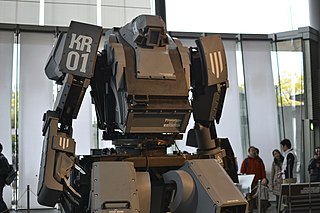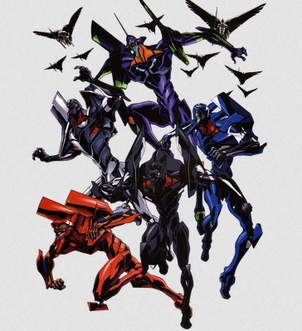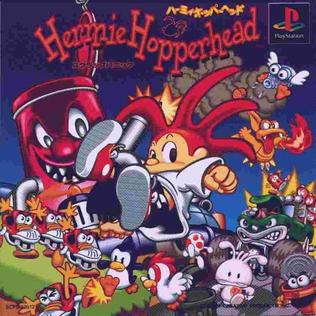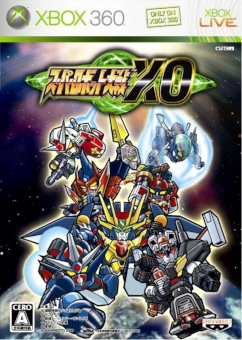
In science fiction, mecha or mechs are giant robots or machines typically depicted as piloted and as humanoid walking vehicles. The term was first used in Japanese after shortening the English loanword 'mechanism' or 'mechanical', but the meaning in Japanese is more inclusive, and 'robot' or 'giant robot' is the narrower term.
AIBO is a series of robotic dogs designed and manufactured by Sony. Sony announced a prototype Aibo in mid-1998, and the first consumer model was introduced on 11 May 1999. New models were released every year until 2006. Although most models were dogs, other inspirations included lion cubs, huskies, Jack Russell terriers, bull terrier, and space explorers. Only the ERS-7, ERS-110/111 and ERS-1000 versions were explicitly a "robotic dog", but the 210 can also be considered a dog due to its Jack Russell Terrier appearance and face. In 2006, AIBO was added into the Carnegie Mellon University Robot Hall of Fame.

The Evangelions, also referred to as Evas, are fictional biomechanical humanoid mechas introduced in the anime television series Neon Genesis Evangelion, produced by Gainax and directed by Hideaki Anno, and in the manga of the same name written and illustrated by Yoshiyuki Sadamoto. In addition to the original animated series, Evangelions appear in its derivative works, including spin-off manga, video games, visual novels, the original video animation Petit Eva: Evangelion@School, and in the Rebuild of Evangelion movies, with considerably different roles and guises.
Super Robot Wars, known in Japan as Super Robot Taisen, is a series of Japanese tactical role-playing video games produced by Bandai Namco Entertainment, formerly Banpresto. Starting out as a spinoff of the Compati Hero series, the main feature of the franchise is having a story that crosses over several popular mecha anime, manga and video games, allowing characters and mecha from different titles to team up or battle one another. The first game in the franchise was released for the Game Boy on April 20, 1991. Later spawning numerous games that were released on various consoles and handhelds. Due to the nature of crossover games and licensing involved, only a few games have been released outside Japan, and in English. The franchise celebrated its 25th anniversary in 2016, and its 30th anniversary in 2021.

Shōji Kawamori is a Japanese anime creator and producer, screenwriter, visual artist, and mecha designer. He is best known for creating the Macross mecha anime franchise and the Diaclone toyline, which were in turn the basis for the Robotech and Transformers franchises, respectively. He is also known for creating The Vision of Escaflowne anime series. He pioneered several innovative concepts in his works, such as transforming mecha and virtual idols. His work has had a significant impact on popular culture, both in Japan and internationally.

Ghost in the Shell is a cyberpunk-themed third-person shooter video game developed by Exact and Production I.G for the PlayStation. A part of the larger Ghost in the Shell media franchise, it utilizes the same English voice cast as the feature film of the same name, although the two do not share a story continuity. The game was first released in July 1997, along with soundtrack albums, an artbook and a guidebook.

Armored Core is a 1997 third-person shooter mecha video game developed by FromSoftware and published by Sony Computer Entertainment for the PlayStation. The game is the first entry in the Armored Core series. A digital port was released in 2007 in Japan and 2015 in North America on the PlayStation Network as a part of the PSone Classics line of games.

Genki Co., Ltd. is a Japanese video game developer. It was founded in October 1990 by Hiroshi Hamagaki and Tomo Kimura, who left Sega to form the company. The company is best known for its racing game titles.
Cruise Chaser Blassty is a science fiction role-playing video game developed by Square for various Japanese computers, including the NEC PC-8801, PC-9801, and Sharp X1. The game featured mecha originally designed by Mika Akitaka and musical contributions by Nobuo Uematsu, being the very first video game he wrote music for. The game had an unusual battle system, which involved the player controlling a customizable mecha robot from a first-person view. It followed a group of young people from Earth caught up in a war between a solar-system spanning government and a group of rebels. After release, the game's story was adapted to a manga and serialized, then released as a pair of standalone books. The manga received a sequel, though the game itself did not.
Mecha, also known as giant robot or simply robot, is a genre of anime and manga that feature mecha in battle. The genre is broken down into two subcategories; "super robot", featuring super-sized, implausible robots, and "real robot", where robots are governed by realistic physics and technological limitations.

Reveal Fantasia: Mariel to Yousei Monogatari Is a Fantasy role playing video game released in 2002 for the PlayStation 2 console by Victor Interactive Software, Inc. in Japan. The game involved an innovative concept of a role playing game involving no battles or fighting. Its game play shows some influence from dating simulation games. The game was never released outside Japan.
Hiromi Sato is a Japanese former singer and songwriter from Iwate Prefecture. She has performed for songs for games and anime, such as Mizuiro, Please Twins!, Green Green, and the Galaxy Angel games. She has also written songs for other artists. Prior to December 10, 2005, her name was written as 佐藤裕美. She is affiliated with ARIA Entertainment and their composing group Elements Garden. She runs the company S Inc.

Valkyrie Profile: Covenant of the Plume is a tactical role-playing game developed by tri-Ace and published by Square Enix for the Nintendo DS handheld game console. Released in 2008 in Japan and 2009 worldwide, the game is the third entry in the Valkyrie Profile series, acting as a prequel to the original game.

Border Break, is a third-person mecha action arcade game developed and published by Sega. It is the first title to run on Sega's RingEdge arcade system board, and was released on September 9, 2009 in Japan, in Hong Kong on January 25, 2010, and in Taiwan on April 1, 2010. A PlayStation 4 version was released in Japan on August 2, 2018.
Arsys Software (アルシスソフトウェア), later known as Cyberhead (サイバーヘッド), was a Japanese video game software development company active from 1985 to 2001.
Valkyrie Profile or Valkyrie is a series of role-playing video games created by Masaki Norimoto and Yoshiharu Gotanda, primarily developed by tri-Ace and published by Square Enix. The series is notable for featuring elements from Norse mythology.

Super Robot Wars V is a tactical role-playing game developed by B.B. Studio and published by Bandai Namco Entertainment for the PlayStation 4 and PlayStation Vita. Released as part of Super Robot Wars' 25th anniversary, it is the eighth standalone entry to the series since Super Robot Wars NEO, with the game's continued focus on the massive crossover between different mecha anime series released in Japan. It is released in Asia on February 23, 2017. A Nintendo Switch and Steam ports of the game were released on October 3, 2019.

Hermie Hopperhead: Scrap Panic is a platform game developed by Yuke's and published by Sony Computer Entertainment for the PlayStation. It was released in Japan in September 1995. The game uses parallax scrolling.

Super Robot Wars XO is a 2006 tactical role-playing video game developed and published by Banpresto for the Xbox 360 in Japan. Part of the company's Super Robot Wars series, it is an updated version of the GameCube installment Super Robot Wars GC (2004). Players control a fleet of mechas from a variety of super robot anime series, including Mobile Suit Gundam and Getter Robo, to defeat opponents on a grid-based map. XO combines tactical role-playing game mechanics with action sequences, which use stylized anime-esque cutscenes unique for each character.












